Key takeaways:
- Single-use plastics harm the environment, taking centuries to decompose and disrupting marine ecosystems.
- Ocean conservation is vital for biodiversity, climate regulation, and supporting livelihoods, with pollution jeopardizing these essential resources.
- Personal actions, such as using reusable alternatives and educating others, can significantly reduce plastic consumption and inspire collective change.
- Supporting initiatives for ocean health, like beach clean-ups and conservation programs, fosters community and contributes to preserving marine life.
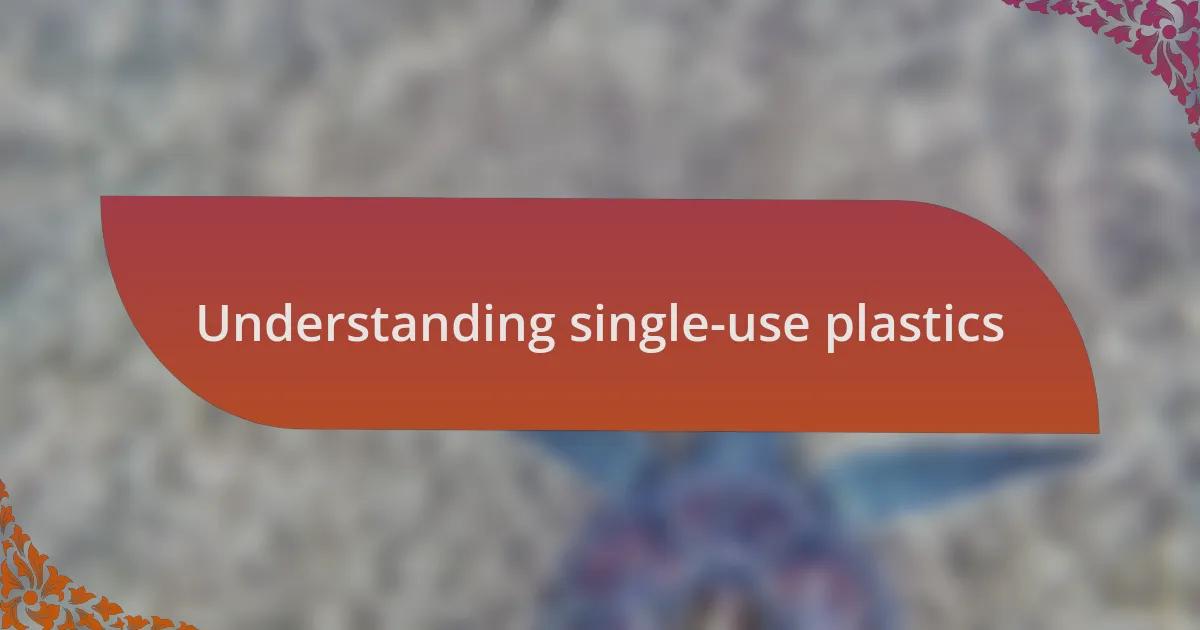
Understanding single-use plastics
Single-use plastics are designed for a single purpose – to be used once and thrown away. This convenience comes with heavy costs, as these materials take hundreds of years to decompose, filling our landfills and oceans with waste. I remember hiking along a beach and stumbling upon a beautifully preserved shell, only to find it surrounded by plastic bottles and bags; it was a stark reminder that convenience often comes at the expense of our environment.
Have you ever considered the sheer volume of single-use plastics consumed daily? From coffee cups to shopping bags, they invade our lives without a second thought. It hit me one morning as I stood in line for coffee, realizing that my to-go cup would likely be discarded within minutes while contributing to the global plastic crisis for generations to come.
Understanding single-use plastics means recognizing their impact on our planet. Each discarded item not only clogs our environments but also endangers marine life that mistake these products for food. As I reflect on my own journey to refuse these plastics, I often wonder: how much different would our world look if everyone made a conscious effort to reduce this waste?
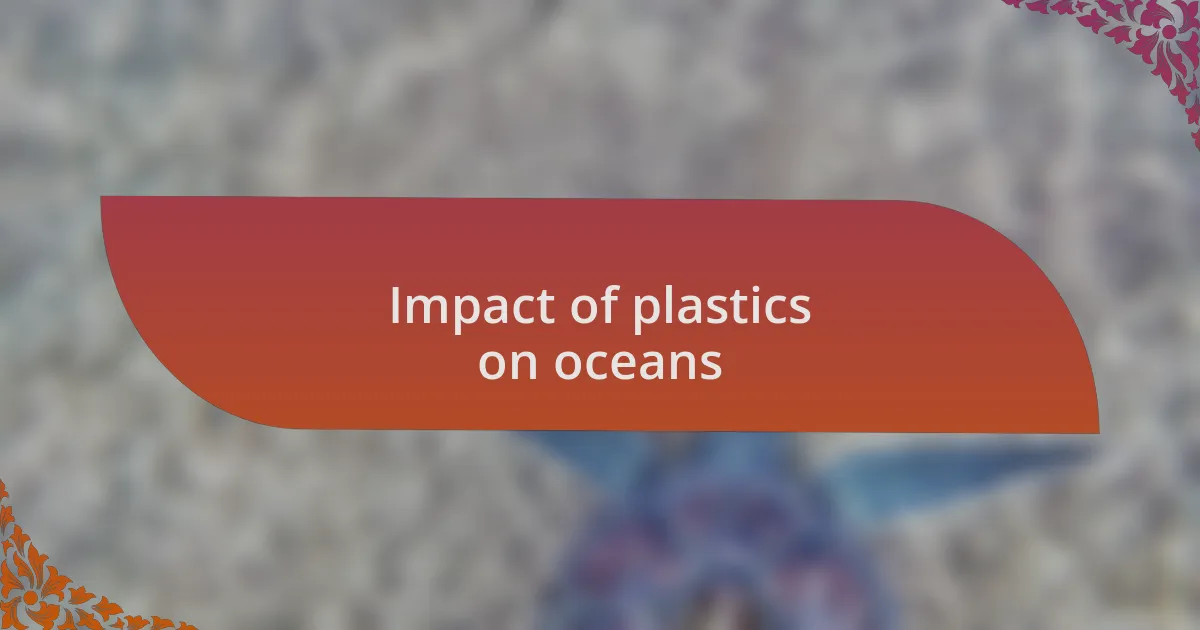
Impact of plastics on oceans
When I think about the impact of plastics on our oceans, it’s alarming to realize that millions of tons of plastic waste enter the sea each year. This pollution not only creates unsightly floating islands but also harms countless marine creatures that ingest or become entangled in this debris. I once watched a documentary showing a turtle struggling with a plastic straw lodged in its nose; that moment shattered my heart and illustrated the urgent need for change.
Furthermore, the presence of plastics in our oceans disrupts entire ecosystems. Microplastics, tiny particles often created by the breakdown of larger plastic items, have infiltrated the food chain, affecting everything from plankton to whales. I can’t help but wonder, what does it mean for us as humans when the fish we eat are filled with the very materials we deem disposable?
The reality is, plastic waste in the ocean doesn’t just disappear; it accumulates and deteriorates marine environments. I distinctly remember a snorkeling trip where vibrant coral reefs teemed with life, yet scattered among the beauty were bits of plastic that docked on the seabed, damaging delicate ecosystems. How can we protect the treasures beneath the waves if we continue to turn a blind eye to what we’re leaving behind?
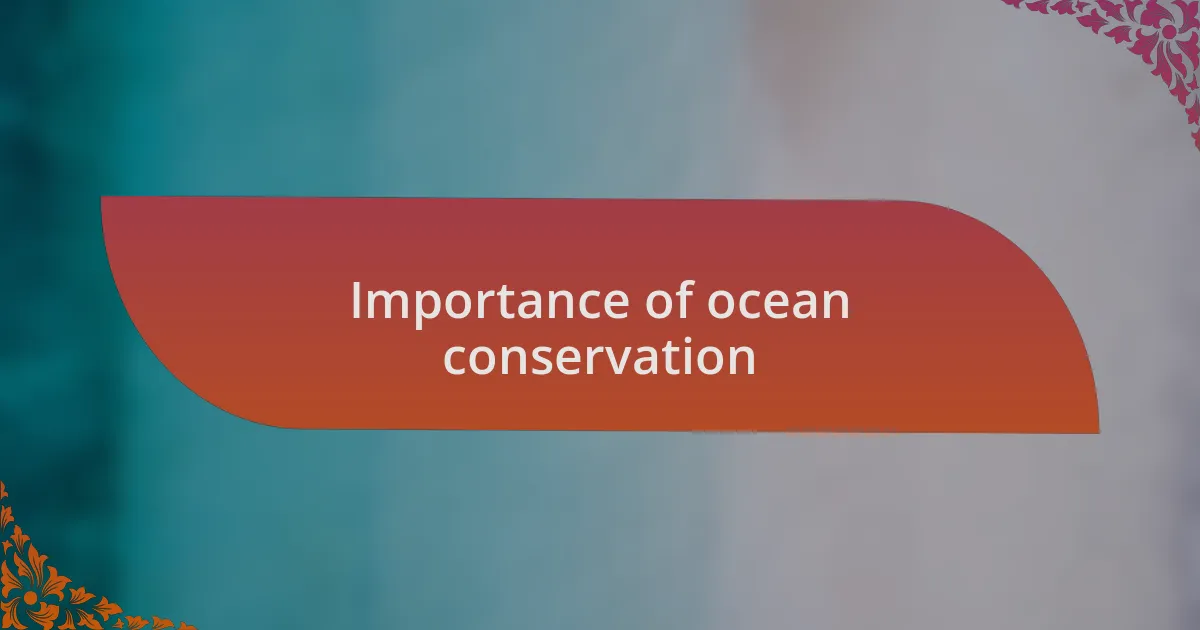
Importance of ocean conservation
The ocean serves as the lungs of our planet, providing vital oxygen and regulating climate. I remember the first time I stood on a beach, the salty air filling my lungs, my mind drifting to how the vast waters around me sustain not only marine life but our very existence. If we continue to neglect ocean conservation, what will future generations miss out on?
Biodiversity within marine ecosystems is crucial for a balanced planet. When I volunteered for a beach cleanup, I was struck by how interconnected everything is; seabirds, fish, and even the smallest sea creatures depend on healthy oceans. Each organism plays a role, and when plastics invade these ecosystems, it throws the entire system out of balance.
Additionally, oceans are a source of livelihood for millions of people around the globe. On a trip to a coastal fishing village, I spoke with local fishermen who expressed their deep concerns over diminishing fish stocks due to pollution. How will they provide for their families if we fail to protect these rich resources? Our continued neglect could lead to dire economic consequences, affecting both local and global communities.
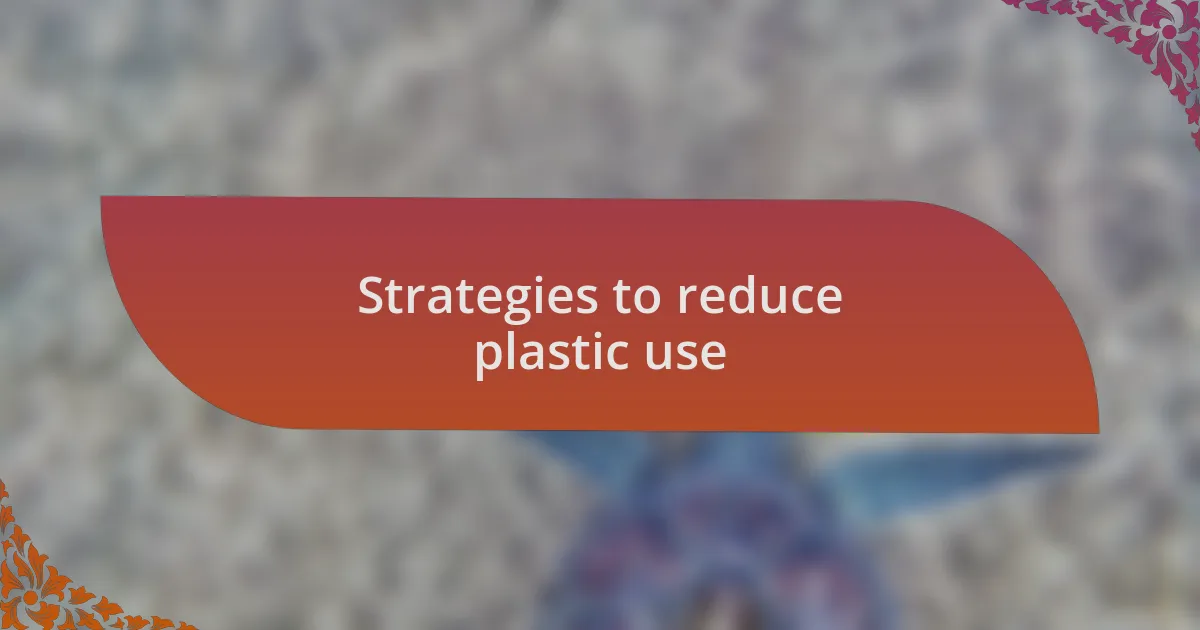
Strategies to reduce plastic use
One effective strategy to reduce plastic use is to adopt reusable alternatives. I recall switching to a stainless steel water bottle, and it completely changed my hydration habits. Not only do I avoid single-use plastics, but I also feel proud every time I fill it up at a water fountain rather than purchasing a plastic bottle. Isn’t it empowering to know that such a small change can contribute to a larger cause?
Another impactful approach is to be mindful of packaging. While grocery shopping, I often bring my own mesh bags for produce and refuse plastic bags at checkout. I still remember the look of surprise from cashiers when I did this for the first time; it was a small moment, but it reinforced my commitment. Isn’t it incredible how just a tiny shift in behavior can inspire those around you?
Additionally, educating ourselves and others about the consequences of plastic pollution can spark significant change. When I shared a documentary about marine life affected by plastics during a community gathering, the emotional responses were undeniable. People began to reassess their habits and advocate for local initiatives. It’s amazing how a shared experience can ignite passions and lead to collective action, isn’t it?
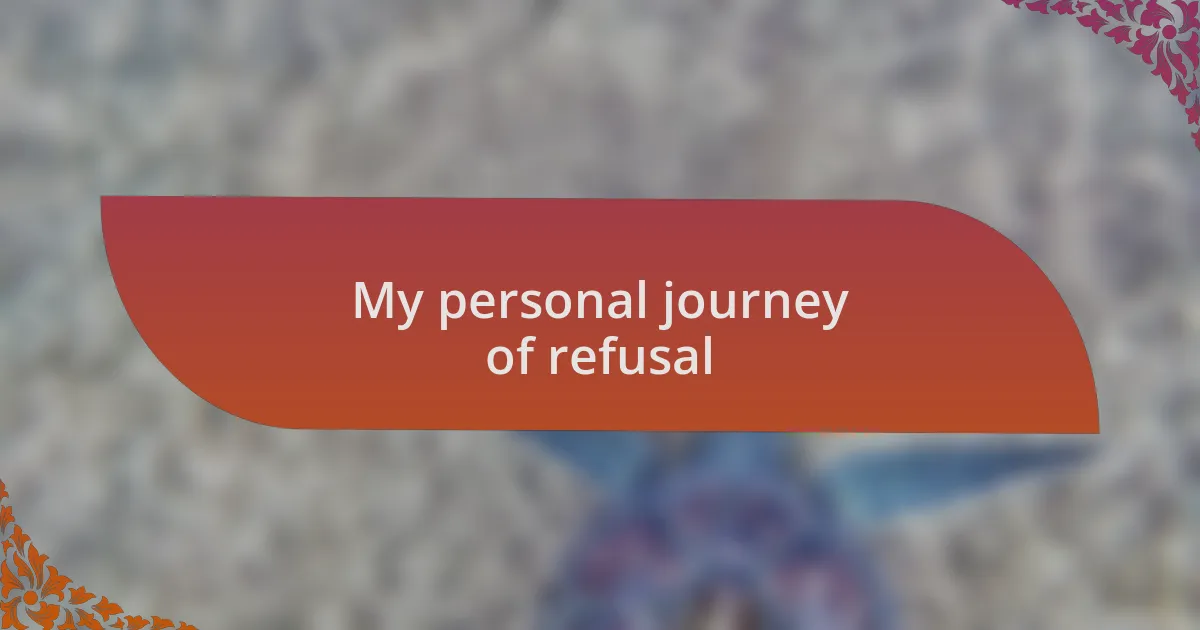
My personal journey of refusal
Taking a stand against single-use plastics began as a personal challenge for me. One day, after noticing the overwhelming amount of plastic waste on a beach clean-up, I felt an urge to change my habits. It was disheartening to think that my small daily choices could contribute to such a massive problem, and that realization propelled me to take action.
Initially, I found it difficult to refuse plastic packaging, especially when convenience seemed to be everywhere. I remember going to a local café with my reusable coffee cup for the first time; I hesitated as I approached the counter. But the moment I confidently ordered my drink in my own cup, I was flooded with a sense of satisfaction. It struck me then how powerful personal choices can be when it comes to altering our collective impact on the environment.
As time went on, I began to notice how my commitment influenced those around me. Friends became curious as I shared the small switches I made, like using beeswax wraps instead of plastic wrap. It opened up conversations about sustainability, and suddenly, I wasn’t just on a journey alone; I was part of a growing movement. Isn’t it fascinating how personal resolve can ripple outward, inspiring others to reflect on their own habits and choices?
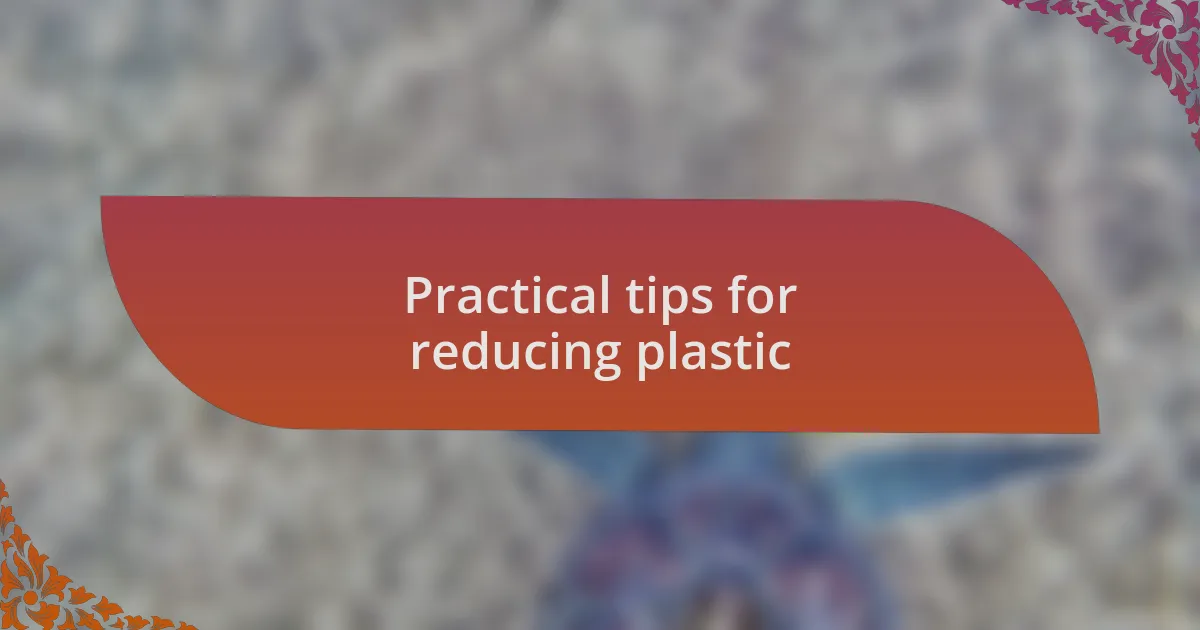
Practical tips for reducing plastic
One practical tip that has genuinely transformed my daily routine is carrying a reusable shopping bag everywhere I go. I once found myself at a grocery store, eyes wide as I remembered my reusable bags sitting in the car, while I watched the cashier pack my items into flimsy plastic bags. The irritation I felt at that moment pushed me to always be prepared. Now, each time I use my sturdy, multi-purpose bags, I experience a sense of pride in contributing to a solution rather than a problem.
Another effective approach has been to plan meals ahead of time, which not only reduces plastic waste but also minimizes food waste. I vividly remember a week when I meticulously crafted a shopping list and organized my meals. To my surprise, I found myself spending less and enjoying fresh produce that wasn’t wrapped in plastic. It felt empowering to make choices that reflected both my values and my desire to protect the oceans. Have you ever considered how a little planning can dramatically shift your impact on the environment?
Lastly, I’ve become an advocate for refilling instead of buying. I regularly visit a local bulk store where I can fill up my own containers with grains, spices, and even cleaning products. The first time I stepped into the store with my jars, I was nervous; could I really break this cycle of consumption? Yet, the thrill of seeing my containers fill up sans plastic was exhilarating. It’s a tangible reminder that every small step counts — one jar at a time, I’m contributing to the fight against plastic pollution.
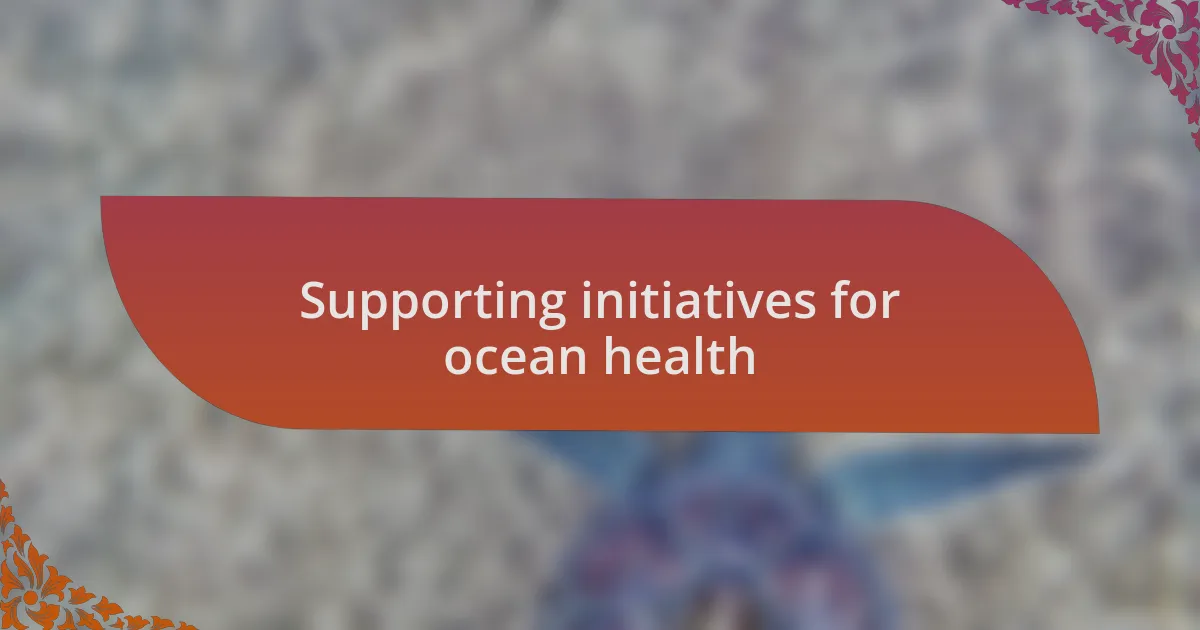
Supporting initiatives for ocean health
Supporting initiatives for ocean health is an essential part of making a meaningful impact. Last summer, I attended a local beach clean-up organized by a group dedicated to preserving marine life. Standing shoulder to shoulder with fellow ocean lovers, I felt an electric sense of community. The sheer volume of trash we collected was eye-opening and reminded me that we are all connected to this delicate ecosystem.
I’ve also chosen to sponsor ocean conservation programs through monthly donations. It was a pivotal moment when I learned that my contribution can help fund research and initiatives aimed at protecting marine habitats. I often wonder, how many creatures are benefiting from my small investment? Knowing that I’m playing a role in providing a safer environment for my favorite seaside animals brings me immense fulfillment.
Moreover, I recently started volunteering for advocacy events that raise awareness about sustainable fishing practices. It was heartwarming to see how passionate people become when they hear that small changes in their habits can lead to significant positives for the ocean. Isn’t it inspiring to think that by supporting such initiatives, we can drive change and ensure the health of our oceans for generations to come?